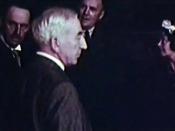Making informed decisions through critical thinking
King Solomon once wrote, "Is there anything of which one can say, Look! This is something new?" (Ecclesiastes 1:10 NIV). This could never be as true as it is for media and the way people have chosen through the ages to interpret and act on what they have absorbed. Media, short for medium is defined in the dictionary as "an intervening substance in which something may act or an effect that can be produced" (Funk & Wagnall, 1975). There have always been two or more sides to a story, which have inspired people in this century, more than any other time in history, to search for the truth and to use critical thinking skills to discern wisely. Three critical thinking processes are necessary in making informed decisions: 1) Questioning the information, 2) Evaluating the situation, and 3) Understanding the perspective of the author.
Questioning the information
Many years ago, a young minister in his thirties began questioning the conventional wisdom of his day and the influences it had on the people.
This wisdom had been plaguing the minds of theologians and others for decades. How could an establishment grounded in the belief that " all men are created equal" under God's law, deny access to the law for so many people in the land? The prejudiced writings of the elite concerned him, and after study and much contemplation, he concluded that St. Augustine was correct when he wrote, "an unjust law is no law at all" (http://almaz.com/nobel/peace/MLK-jail.html/).
Speaking out in churches primarily, he began to denounce the practices and attitudes of the establishment. The media and the opinion writers', relentless in their attack on him, portrayed him as a heretic and an instigator of tension and violence. Although factions of his so called followers...


